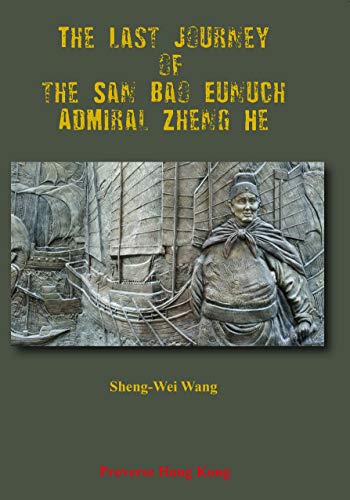The last journey of the San Bao Eunuch Admiral Zheng He
By Sheng-Wei Wang
Hong Kong, Proverse Hong Kong, 2019
391 pages, ISBN: 978-988-8491-66-7
Beginning in 1405, in order to expand the Ming Dynasty’s tributary system, Chinese Emperor Yongle commanded Admiral Zheng He to lead giant fleets of large ships, the “Treasure Fleet,” across the seas seven times to Southeast Asia, South Asia, Western Asia, the Persian Gulf, Arabia, and East Africa. According to legend, Zheng’s large ships each carried hundreds of sailors on four decks and were almost twice as long as any wooden ship ever recorded.
In her book, Dr. Wang carefully examined the historical facts of the last journey of the San Bao eunuch, Admiral Zheng He, his seventh voyage which may have reached as far as the ancient American Indian city, Cahokia, now in the US central Mississippi Valley, in 1433, long before Christopher Columbus set foot for the first time in the Americas.
While these voyages marked the greatest episode of Chinese sailing, they were terminated soon after Zheng He’s last voyage due to a momentous change of policy by succeeding Emperors Xuande and Hongxi: to isolate itself from the rest of the world by suspending naval expeditions abroad.
Since all records and artifacts about the seven voyages were destroyed and banned, it has been difficult to reconstruct the history of these expeditions. In 1597, Chinese writer Luo Maodeng, knowing the history of some of these voyages wished to record them, but conscious of the possible penalties, decided to record the facts “under a veil.”
Dr. Wang has done substantial scientific analysis of Luo’s work, using relevant geographical, climatological and cultural information, and deciphering hints in Luo’s account. She has carefully attempted to extract the trans-Atlantic navigational routes, timelines and other relevant evidence. Dr. Wang argues that Ming Chinese sailors and ships reached far beyond what was previously accepted in modern times and provides novel insights into the history of 15th-century Chinese maritime explorations.
Dr. Sheng-Wei Wang has a BS from Tsing Hua University in Taiwan and a PhD from the University of Southern California. In her early career, she was a staff scientist at the Lawrence Berkeley National Laboratory in the United States. In 2006, she became an independent scholar and freelance writer, and founded the China-U.S. Friendship Exchange. A year later, she launched an English-Chinese bilingual website to promote US-China relations, which has attracted over a million viewers to date.
In 2013, she started research on Zheng He and has since completed two related books. She has given presentations on her Zheng He research at international conferences, universities, Zheng He Societies, and others. She is a founding member of the International Zheng He Society founded in Malacca.
Reviewed by
Hwa-Wei Lee, Ph.D.
Retired former Chief, Asian Division, Library of Congress
Dean of Libraries Emeritus, Ohio University
Edited by Jaena Rae Cabrera

